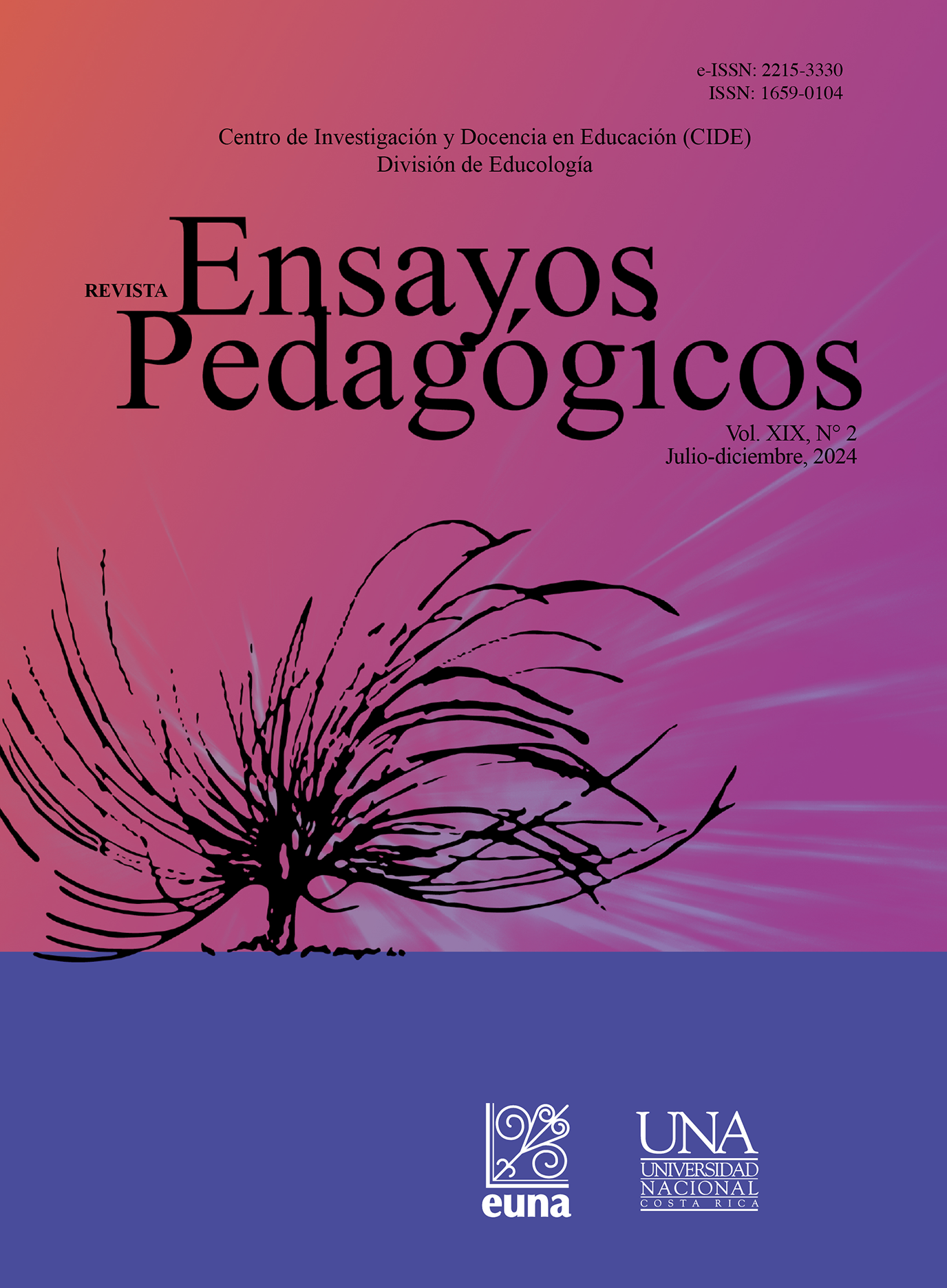The Construction of the Teacher’s Digital Identity in the Context of Technological Disruption
DOI:
https://doi.org/10.15359/rep.19-2.4Keywords:
initial training, teacher, teacher's digital identity, technological disruptionAbstract
Technological disruption is transforming worldviews, facilitating access to knowledge, modifying social interactions, and reconfiguring identities. In the education sector, schools and teachers are adapting and will continue to evolve to prepare new generations of students adequately. This essay focuses on analyzing the factors that impact the construction of digital teacher identity, using Fred Korthagen’s onion model as a starting point. Challenges such as changing teacher roles, continuing education, the development of digital educational communities, and the need for more reflective practice in initial training are discussed. It is concluded that the construction of a digital teaching identity implies generating transformations through the integration of digital technologies in the classroom, balancing pedagogical and technological components to create radically new learning environments.
References
Ackermann, E. K. (2015). Give me a place to stand and I will move the world! Life-long learning in the digital age. Journal for the Study of Education and Development, 38(4), 689-717. https://doi.org/10.1080/02103702.2015.1076265
Arancibia, M. L., Cabero, J. y Marín, V. (2020). Creencias sobre la enseñanza y uso de las tecnologías de la información y la comunicación (TIC) en docentes de educación superior. Formación Universitaria, 13(3), 89-100. https://dx.doi.org/10.4067/S0718-50062020000300089
Avello, R., Villalba-Condori, K. y Arias-Chavez, D. (2021). Algunos mitos más difundidos sobre las TIC en la educación. ¿Cómo evitarlos? Mendive. Revista de Educación, 19(4), 1359-1375. http://scielo.sld.cu/scielo.php?script=sci_arttext&pid=S1815-76962021000401359&lng=es&tlng=es
Bauman, Z. (2000). Modernidad líquida. Fondo de cultura económica.
Beijaard, D. (2018). Teacher learning as identity learning: models, practices, and topics. Teachers and Teaching, 25(1), 1-6. https://doi.org/10.1080/13540602.2019.1542871
Cantón, I. y Tardif, M. (2018). Identidad profesional docente. Narcea Ediciones.
Careaga, M. (2020). Aproximaciones a la pistemología para universitarios. RIL editores.
Correa, J. M., Fernández, L., Gutiérrez-Cabello, A., Losada, D. y OchoaAizpurua, B. (2015). Formación del Profesorado, Tecnología Educativa e Identidad Docente Digital. Revista Latinoamericana de Tecnología Educativa, 14(1), 45-56. https://doi.org/10.17398/1695-288X.14.1.45
Cuadra-Martínez, D., Castro-Carrasco, P. J., Oyanadel, C. y González-Palta, I. N. (2021). Teacher’s professional identity during university education: a systematic review of qualitative research. Formación Universitaria, 14(4), 79-92. http://dx.doi.org/10.4067/S0718-50062021000400079
Engeness, I. (2020). Teacher facilitating of group learning in science with digital technology and insights into students’ agency in learning to learn. Research in Science & Technological Education, 38(1), 42-62. https://doi.org/10.1080/02635143.2019.1576604
Feiman-Nemser, S. (2001). From Preparation to Practice: Designing a Continuum to Strengthen and Sustain Teaching. Teachers College Record, 103(6), 1013-1055. https://doi.org/10.1111/0161-4681.00141
Fullan, M. (2013). Stratosphere: Integrating technology, pedagogy, and change knowledge. Pearson.
Fullan, M. y Hargreaves, A. (1992). What’s worth fighting for in your school? Working together for improvement. Open University.
Fullan, M. y Langworthy, M. (2014). Cómo las nuevas pedagogías logran el aprendizaje en profundidad. Pearson.
Habibi, A., Riady, Y., Al-Adwan, A. S. y Albelbisi, N. A. (2022). Beliefs and Knowledge for Pre-Service Teachers’ Technology Integration during Teaching Practice: An Extended Theory of Planned Behavior. Computers in the Schools, 40(2), 107-132. https://doi.org/10.1080/07380569.2022.2124752
Harmes, J. C., Welsh, J. L. y Winkelman, R. J. (2016). A framework for defining and evaluating technology integration in the instruction of real-world skills. En Leadership and Personnel Management: Concepts, Methodologies, Tools, and Applications (pp. 481-506). IGI Global.
Korthagen, F. A. J. (2004). In search of the essence of a good teacher: Towards a more holistic approach in teacher education. Teaching and Teacher Education, 20(1), 77-97. https://doi.org/10.1016/j.tate.2003.10.002
Korthagen, F. A. J. (2010). La práctica, la teoría y la persona en la formación del profesorado. Revista Interuniversitaria de Formación del Profesorado, 68(24.2), 83-101. https://research.vu.nl/ws/portalfiles/portal/2747439/247824.pdf
Korthagen, F. A. J. (2016). Pedagogy of teacher education. En J. Loughran y M. Hamilton (Eds.), International Handbook of Teacher Education volume 1 (pp. 311-346). Springer. https://doi.org/10.1007/978-981-10-0366-0_8
Marcelo, C. (2010). La identidad docente: constantes y desafíos. Revista Interamericana de Investigación, Educación y Pedagogía, 3(1),15-42. https://www.redalyc.org/articulo.oa?id=561058717001
McLuhan, M. (1964). The extension of man: Understanding media. McGrawHill.
Mishra, P. y Koehler, M. J. (2006). Technological pedagogical content knowledge: A framework for teacher knowledge. Teachers College Record, 108(6), 1017-1054. https://doi.org/10.1111/j.1467-9620.2006.00684.x
Olave, S. (2020). Revisión del concepto de identidad profesional docente. Revista Innova Educación, 2(3), 378-393. https://revistainnovaeducacion.com/index.php/rie/article/view/3
Ortega y Gasset, J. (1914). Meditaciones del Quijote. Publicaciones de la Residencia de Estudiantes. https://ia800207.us.archive.org/24/items/meditacionesdelq00orte/meditacionesdelq00orte.pdf
Pajares, M. F. (1992). Teachers’ Beliefs and Educational Research: Cleanning Up a Messy Construct. Review of Educational Research, 62(3), 307-332. https://ssrlsig.org/wp-content/uploads/2018/02/pajares-1992-teachers_-beliefs-and-educational-research-cleaning-up-a-messy-construct.pdf
Polly, D., Martin, F. y Byker, E. (2022). Examining Pre-Service and In-Service Teachers’ Perceptions of Their Readiness to Use Digital Technologies for Teaching and Learning. Computers in the Schools, 40(1), 22-55. https://doi.org/10.1080/07380569.2022.2121107
Prensky, M. (2001). Digital Natives, Digital Immigrants Part 1. On the Horizon, 9(5), 1-6. https://doi.org/10.1108/10748120110424816
Prensky, M. (2015). Enseñar a nativos digitales. Ediciones SM.
Puentedura, R. R. (2014). SAMR and TPCK: A hands-on approach to classroom practice. Hipassus.
Selwyn, N. (2022). Education and technology. Key issues and debates. Bloomsbury.
Siemens, G. (2004). Conectivismo: Una teoría de aprendizaje para la era digital. https://ateneu.xtec.cat/wikiform/wikiexport/_media/cursos/tic/s1x1/modul_3/conectivismo.pdf
Vaillant, D. y Marcelo, C. (2021). Formación inicial del profesorado: Modelo actual y llaves para el cambio. REICE. Revista Iberoamericana sobre Calidad, Eficacia y Cambio en Educación, 19(4), 55-69. https://doi.org/10.15366/reice2021.19.4.003
Zimmer, W. K., McTigue, E. M. y Matsuda, N. (2021). Development and validation of the teachers’ digital learning identity survey. International Journal of Educational Research, 105, 101717. https://doi.org/10.1016/j.ijer.2020.101717
Downloads
Published
How to Cite
Issue
Section
License
Copyright (c) 2024 Ensayos Pedagógicos Journal

This work is licensed under a Creative Commons Attribution-NonCommercial-NoDerivatives 4.0 International License.
Ensayos Pedagógicos is subscribed to the Attribution-NonCommertial-NoDerivatives 4.0 International Creative Commons Licence, which allows both authors and readers to freely download, store, copy, and distribute the final approved publisehd version of the manuscript (post-print) as long as this is done without commercial purposes, no derivative works are generated, and the source and author are mentioned. As well, Ensayos Pedagógicos declares that authors will remain the rightful owners of the copyrights of their work in perpetuity.







